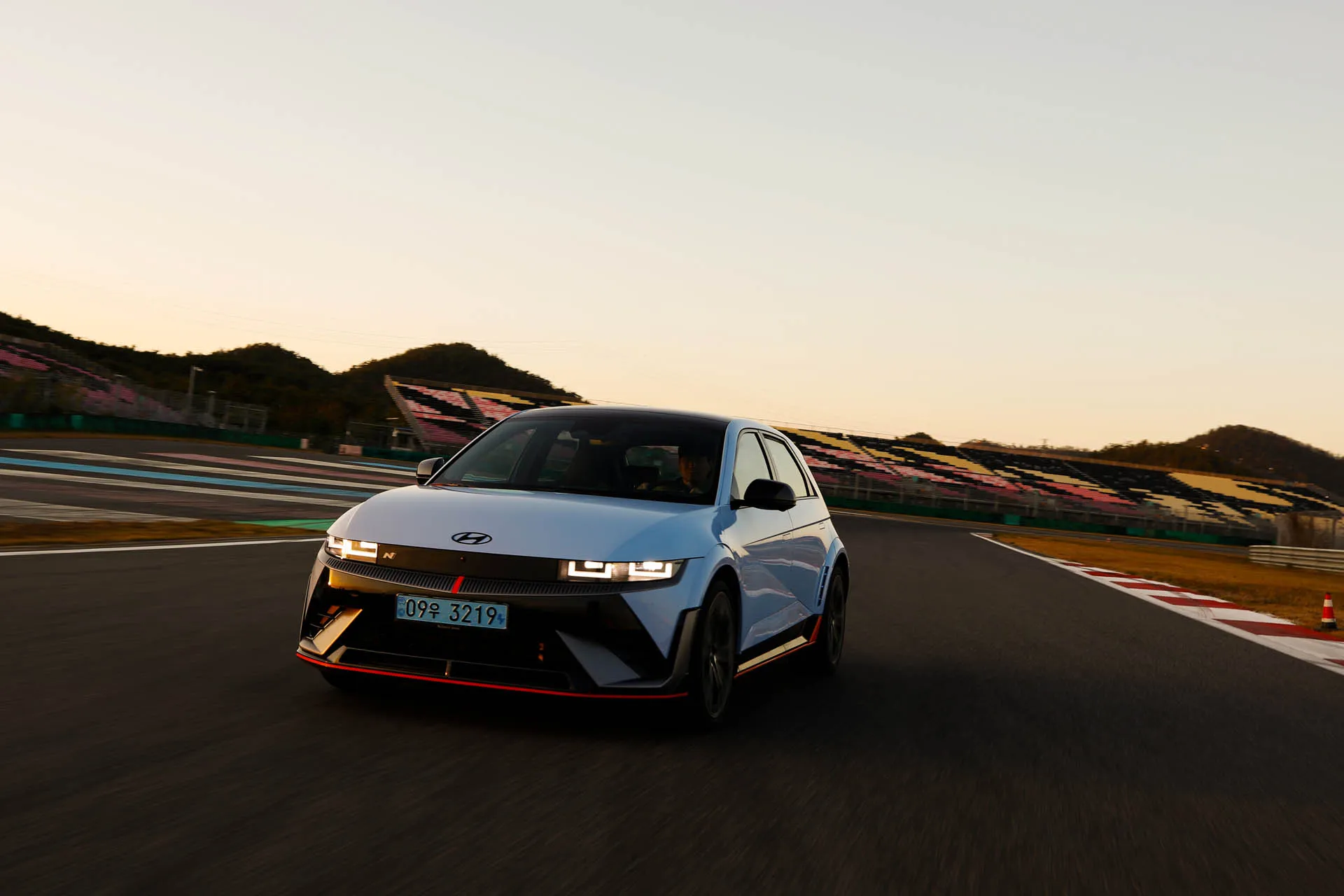Hyundai’s N division is only a few years old, barely out of diapers compared to venerable, in-house performance sub-brands such as Mercedes-Benz’s AMG or BMW’s M. But already in that time, it’s defined itself as the creator of some properly rowdy, enjoyable machines.
Indeed, when you’re handed the keys to a little Hyundai dipped in periwinkle blue and trimmed with a crimson orange, you know you’re in for a good time.
But, historically, that’s also meant having to deal with something that’s more punishing to drive on a daily basis than an everyday Hyundai. For the latest N, that’s not the case. This is the 2024 Hyundai Ioniq 5 N, a hotted-up version of Hyundai’s visually sharp, functionally compelling EV with twice the power and dozens of performance upgrades. Best of all, none of those upgrades have compromised this machine’s core appeal.
2024 Hyundai Ioniq 5 N
Hyundai Ioniq 5 N: Big upgrades, inside and out
It starts with power and Hyundai’s engineers created it with a lot more than a motor swap. The Ioniq 5 N offers 641 hp and 545 lb-ft of torque from two motors, one up front and one at the rear. That’s twice the power of the base Ioniq 5, a car that’s already quick and fun to drive.
We’ve seen plenty of EVs offering big power numbers and quick acceleration times that they can only achieve once or twice before needing a little time to cool off. To ensure the Ioniq 5 N isn’t a one-lap-wonder, Hyundai engineered a new, bigger battery pack (84 kwh versus the regular car’s 77 kwh) and added extra cooling, too.
Hyundai N technical advisor Albert Biermann promised the changes are enough for the Ioniq 5 N to do two full laps of the Nurburgring at speed in Endurance mode before needing to cut power to manage thermal load. That’s about 16 minutes and more than 28 miles of hard running on one of the hardest tracks in the world, meaning your usual 20-minute trackday session should be possible.
Bigger power means bigger brakes, and the Ioniq 5 N has chunky, 4-piston monobloc calipers that clamp 15.7-inch rotors up front with single-piston units out back to pinch 14.2-inch calipers. But, more significantly, the car can decelerate at up to 0.6 g through regeneration alone, meaning those brakes should survive some serious track action.
More grip is also required, so you’ll find Pirelli P Zero 275/35R21 tires at all four corners. With more grip comes more chassis flex, so Hyundai engineers added structural reinforcement to the front and rear subframes, plus additional welding and adhesives throughout. An electronically actuated limited-slip rear differential helps put the power down effectively, and the 5 N has a new a suspension that sits 0.8 inch lower and has bigger, adaptive dampers at each corner, offering a wider range of performance between comfort on one end and sport on the other.
All that is bundled in a body that carries over all the weird angularity of the base Ioniq 5, injected with a fair bit of additional visual angst in the form of a big front splitter, a rear wing and diffuser, plus side skirts so aggressively pronounced you’re guaranteed to bruise a shin at least once when climbing into this thing. (I surely did.)
Hyundai didn’t give any figures to define how those big wings and diffusers have boosted downforce rates at various speeds, perhaps indicating that aesthetics are the priority here. Frankly, I can appreciate that. The car carries a reasonable 0.313 coefficient of drag, not far off from the 0.28 cd of a base Ioniq 5, meaning that N hasn’t totally killed the car’s aerodynamic finesse.
Overall it’s a comprehensive upgrade package, much more so than the power infusion given to the Kia EV6 GT. But the upgrades don’t stop there.
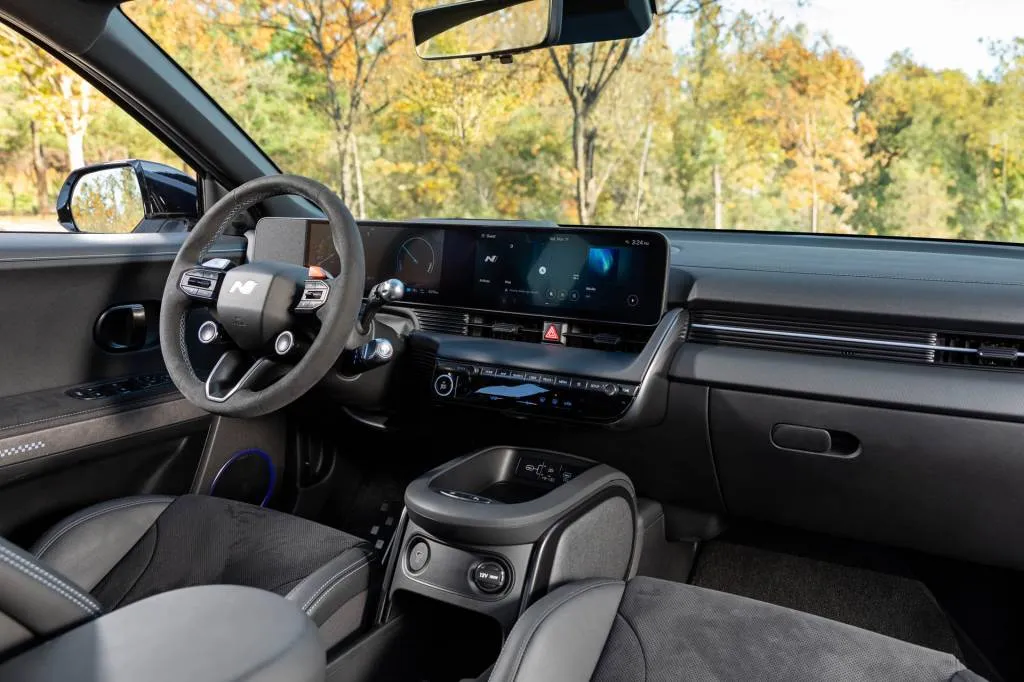
2024 Hyundai Ioniq 5 N
Hyundai Ioniq 5 N: Hard-coded performance
The biggest upgrades to the Ioniq 5 N might actually be found in the software. While the car offers the same dual 12.3-inch display setup as the base Ioniq 5, with two panels joined at the hip forming both gauge cluster and touchscreen infotainment experience (including wireless Android Auto and Apple CarPlay), the Ioniq 5 N includes many custom screens and options. These not only help differentiate this car but also provide endless opportunities for minutiae-loving owners to go crazy customizing the performance of their machines.
One of the most fun settings is a simple slider to set torque distribution. Do you want a front-drive machine for some weird reason? Just drag that slider to the left. Are you craving a wild, RWD burnout? Drag that control in the other direction and get ready to order yourself a new set of Pirellis.
You’ll also find options for stuff such as N Pedal, a track-focused, high-regen mode that ostensibly provides a permanent trail-braking effect, on top of all the usual tweakable settings for things such as damper stiffness and throttle sharpness.
But the most interesting options have to do with the Ioniq 5 N’s fake engine noises and its fake transmission. Yes, an 8-speed DCT lives in the Ioniq 5 N, or a virtual one anyway, controlled by the paddles on the back of the steering wheel. Enable this setting, and the car not only pipes one of three fake engine noises into the cabin but it optionally broadcasts them outside the car, too.
This isn’t just a trick for rowdy cars and coffee exhibitions. The intent here is to give drivers on the track more reference points than you’d get in an otherwise silent EV. It’s also meant to provide the additional bit of endorphin rush received when running a high-strung motor through its rev range. Weirdly, it kind of works.
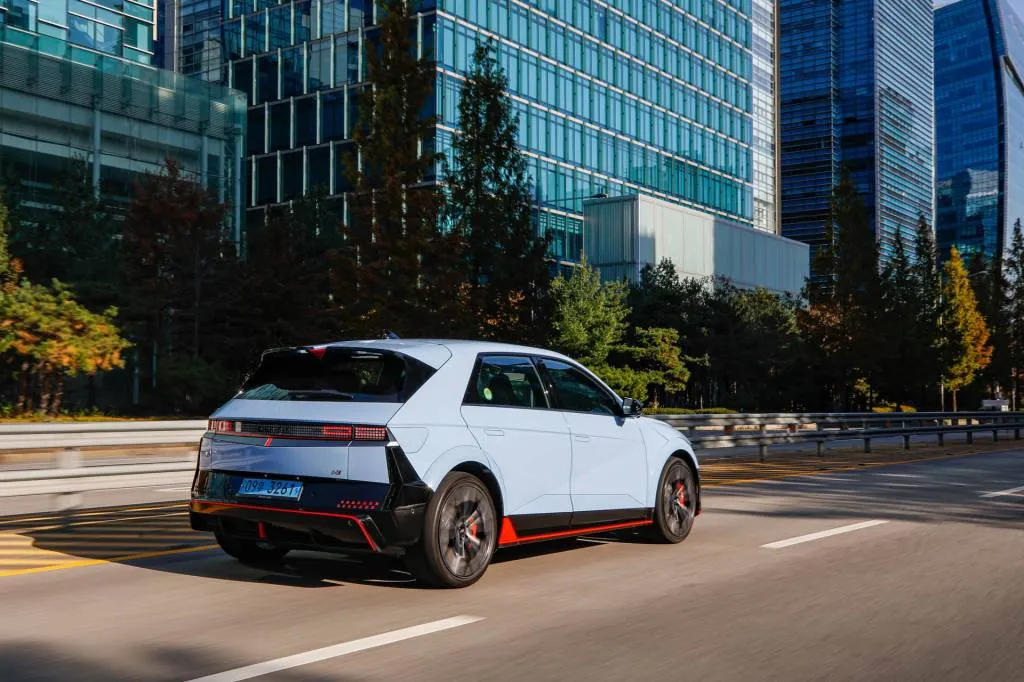
2024 Hyundai Ioniq 5 N
Hyundai Ioniq 5: Ride, handling, and dynamics
South Korea is among the worst places on the planet to drive a performance-oriented car like the Ioniq 5 N. Yes, it’s the birthplace of this machine, but with the frustratingly low speed limits, incredibly dense traffic, and automated speed cameras everywhere, it’s not a place for driving with wild abandon.
Still, those congested streets and highways were a great place to verify that Hyundai didn’t break the stellar Ioniq 5 when affixing that N to the back. Driven in Eco or Normal modes, the 5 N is nearly as sweet as a regular Ioniq. The ride quality is necessarily a bit compromised thanks to those big, low-profile tires, but it’s not too harsh and, otherwise, you’d hardly know the difference.
In these modes, the paddles act as they do on a regular Ioniq 5, toggling braking regen from low to high. In its highest setting, the Ioniq 5 N’s regen will promptly bring the car right down to a stop. There’s no loss of functionality on the highway, either, as the Ioniq 5 N offers the latest flavor of Highway Drive Assist with active lane control, adaptive cruise control, and even assisted lane changes.
But, to get a feel for the performance of the Ioniq 5 N, I needed a closed course. Thankfully, we had one at the Korea International Circuit. Here, the Ioniq 5 N was a surprising treat, despite its mass. One thing Hyundai didn’t do was lighten the 5 N. In fact, it weighs more than a regular Ioniq 5, which comes in just shy of 4,000 pounds in AWD trim. Hyundai didn’t say just how heavy the N is, but on the track, you can definitely feel its heft, especially in the tighter bends.
As I first got up to speed, the Ioniq 5 N just kept pushing its nose through the bends. But, instead of going into terminal understeer, turning the wheel a little more and giving more throttle pulled the nose right around. Enabling N Pedal mode for extra regen changed that character significantly, making the Ioniq 5 N feel surprisingly loose at the rear end. The extra weight put on the nose through corners made a world of difference.
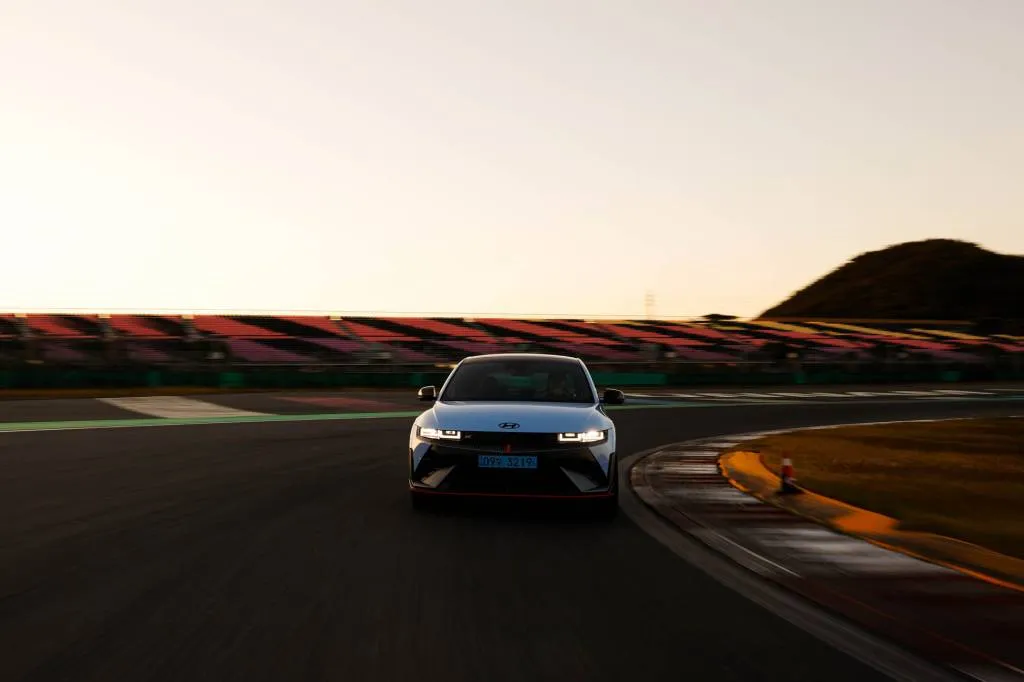
2024 Hyundai Ioniq 5 N
In that mode, I got well and truly sideways coming out of one of the corners, requiring a big correction that firmly imprinted a bigger grin on my face.
As for the fake dual-clutch transmission and engine noises, I confess I didn’t like any of the three synthetic notes, but the presence of that sound did help me better gauge my speed going into corners. Likewise, using simulated gears made the new track a little easier to parse and provided reference points for what gear could be achieved in the various track sectors.
I’ll need far more time to pass judgment on any of that since there are so many options to toggle and sliders to fiddle with. It’d be great to spend more time sampling the torque distribution and also feeling with more detail how the N Pedal mode affects the car’s balance.
I’ll also need more time to confirm whether this car has the stamina for proper trackday antics. My time in the Ioniq 5 N was limited to seven, less than full-throttle laps of a bisected Korea International Circuit, about a mile and half per lap. At the end of that session, I didn’t notice any performance derating by the car to manage temps, but then it wasn’t what I would call maximum attack.
Hyundai’s Biermannsaid a goal was for you to do 20 minutes on the track, followed by 20 minutes at a trackside fast charger, followed by another 20-minute session without any derating of power or performance. That’s a tall order for any EV, and a longer track day is needed to see how it handles so much punishment. For now, it feels capable, but I’d like more proof.
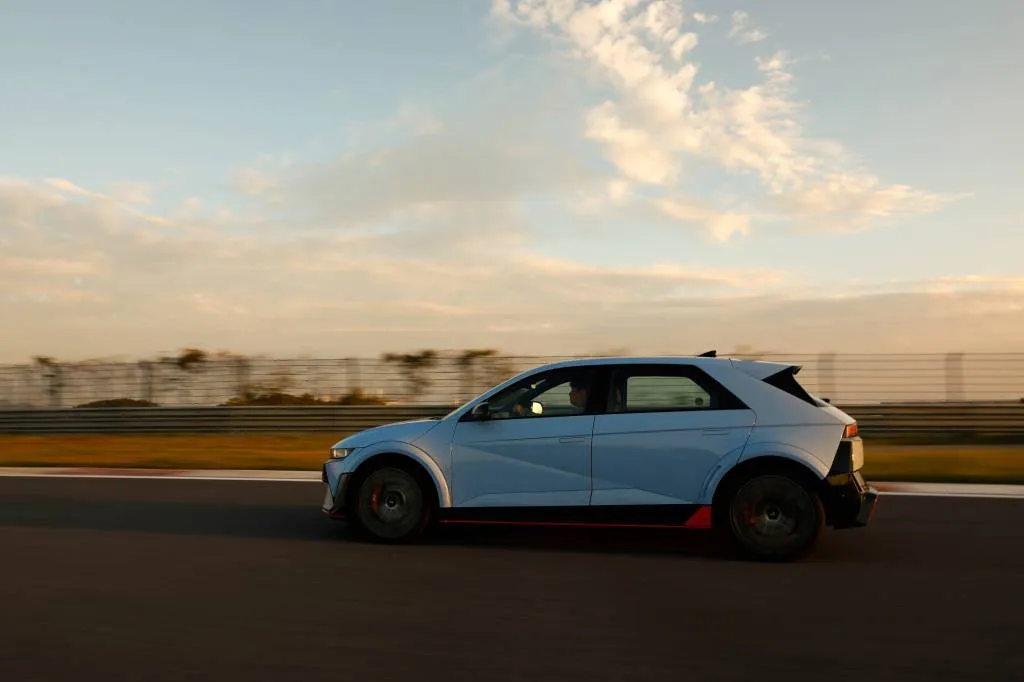
2024 Hyundai Ioniq 5 N
Hyundai Ioniq 5 N: Wild performance at an undisclosed price
The Ioniq 5 N is remarkable because it offers the kind of engagement and fun deserving of its periwinkle hue, yet it hasn’t given up much of the comfort and practicality of a regular Ioniq 5. Thanks to its extreme levels of configurability, you can quiet it right down, soften the suspension, and temper the throttle response to create the smooth, calm driving experience you want in an EV.
It’s a great and desirable package, but it might be a spendy one. Hyundai hasn’t provided pricing yet. Given the Ioniq 5 N carries so much more specialized equipment than its hot-rod sister, the Kia EV6 GT, I have to imagine it’ll come in significantly higher than that car’s roughly $63,000 starting price. Just how much higher remains to be seen.
—by Tim Stevens
Hyundai paid for travel and lodging for Motor Authority to bring you this firsthand report.

